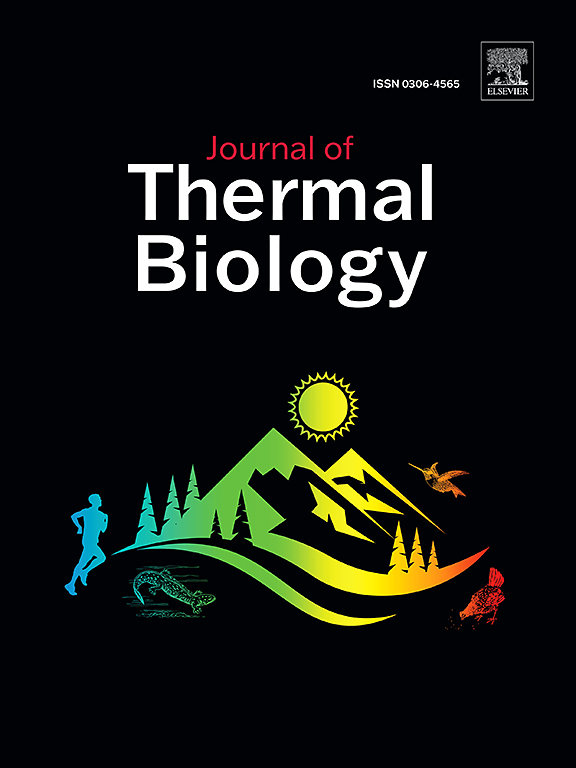Thermal ecology and swimming performance of native tadpoles Dryophytes femoralis in central Florida
IF 2.9
2区 生物学
Q2 BIOLOGY
引用次数: 0
Abstract
Urbanization and climate warming have contributed to global amphibian declines in recent decades, and amphibians are particularly vulnerable to warming because temperature influences their physiological processes across all life stages. Tadpole responses to warming in tropical climates are relatively understudied, and previous studies demonstrated species-specific responses to warming temperature. Warming ponds may quicken tadpole development and increase thermal tolerances, but increasing local temperatures push populations towards their physiological limits. Specifically, baseline responses of thermal ecology traits of pinewoods tree frog (Dryophytes femoralis) tadpoles in Florida to warming temperature are unknown. Herein, we tested if the thermal ecology and swimming performance of a native Florida tadpole varied with rearing temperature to determine if these traits exhibit plasticity. We collected eggs from wild populations of D. femoralis in Central Florida and utilized common garden experiments to assess critical thermal maximum (CTmax), minimum (CTmin), thermal safety margins (Tsm), thermal preference (Tset), and swimming performance across different rearing temperatures. Importantly, variation in traits was better explained by clutch ID, indicating the role of maternal effects. Increases in critical thermal thresholds and thermal safety margins at warmer rearing temperatures suggest plasticity in these traits and potential to adapt to rising temperatures. While thermal preference appeared fixed, complex interactions between rearing temperature and test temperature predicted swimming performance. These results demonstrate that although D. femoralis tadpoles have the ability to adjust their thermal thresholds – the responses of other critical traits, like swimming performance are less clear, at least within the temperature range tested in this study. However, warming ponds may soon exceed the temperatures tadpoles can tolerate, even via phenotypic plasticity. Our findings emphasize the need to prioritize the conservation of cooler habitats and fill in gaps in our understanding of species-specific responses to a warming environment, to ensure the survival of vulnerable amphibian populations.
佛罗里达中部地区原生蝌蚪的热生态和游泳性能
近几十年来,城市化和气候变暖导致全球两栖动物数量减少,而两栖动物特别容易受到气候变暖的影响,因为温度会影响它们整个生命阶段的生理过程。蝌蚪对热带气候变暖的反应研究相对较少,以前的研究表明物种对变暖的反应是特定的。变暖的池塘可能会加速蝌蚪的发育,提高它们的热耐受性,但当地温度的升高会使蝌蚪的数量达到生理极限。具体来说,佛罗里达松林树蛙蝌蚪的热生态特征对变暖温度的基线反应是未知的。在此,我们测试了佛罗里达原生蝌蚪的热生态和游泳表现是否随着饲养温度的变化而变化,以确定这些特征是否表现出可塑性。本研究采集了美国佛罗里达州中部地区的D. femoralis野生种群的卵,并利用普通花园实验对不同饲养温度下的临界热最大值(CTmax)、最小值(CTmin)、热安全边际(Tsm)、热偏好(Tset)和游泳性能进行了评价。重要的是,这些性状的变异可以更好地用卵期ID来解释,这表明了母体效应的作用。在较高的饲养温度下,临界热阈值和热安全边际的增加表明这些性状具有可塑性和适应温度上升的潜力。虽然热偏好似乎是固定的,但饲养温度和测试温度之间的复杂相互作用预测了游泳表现。这些结果表明,尽管D. femoralis蝌蚪有能力调节其热阈值,但其他关键特征的反应,如游泳性能,不太清楚,至少在本研究测试的温度范围内。然而,变暖的池塘可能很快就会超过蝌蚪所能忍受的温度,即使是通过表型可塑性。我们的研究结果强调,需要优先保护较冷的栖息地,并填补我们对物种对变暖环境的特定反应的理解空白,以确保脆弱的两栖动物种群的生存。
本文章由计算机程序翻译,如有差异,请以英文原文为准。
求助全文
约1分钟内获得全文
求助全文
来源期刊

Journal of thermal biology
生物-动物学
CiteScore
5.30
自引率
7.40%
发文量
196
审稿时长
14.5 weeks
期刊介绍:
The Journal of Thermal Biology publishes articles that advance our knowledge on the ways and mechanisms through which temperature affects man and animals. This includes studies of their responses to these effects and on the ecological consequences. Directly relevant to this theme are:
• The mechanisms of thermal limitation, heat and cold injury, and the resistance of organisms to extremes of temperature
• The mechanisms involved in acclimation, acclimatization and evolutionary adaptation to temperature
• Mechanisms underlying the patterns of hibernation, torpor, dormancy, aestivation and diapause
• Effects of temperature on reproduction and development, growth, ageing and life-span
• Studies on modelling heat transfer between organisms and their environment
• The contributions of temperature to effects of climate change on animal species and man
• Studies of conservation biology and physiology related to temperature
• Behavioural and physiological regulation of body temperature including its pathophysiology and fever
• Medical applications of hypo- and hyperthermia
Article types:
• Original articles
• Review articles
 求助内容:
求助内容: 应助结果提醒方式:
应助结果提醒方式:


